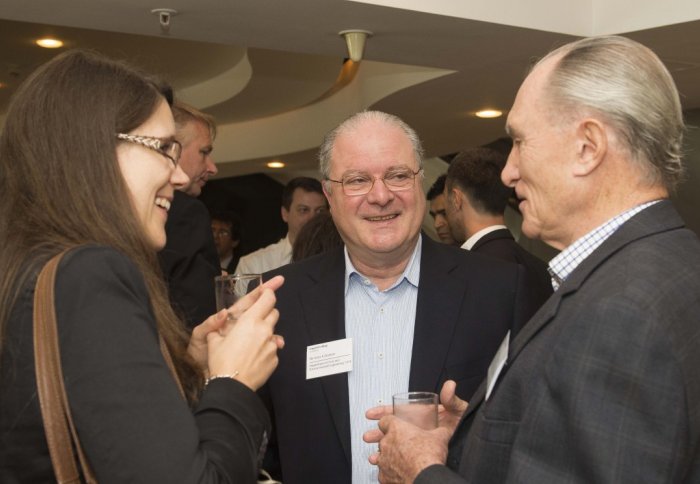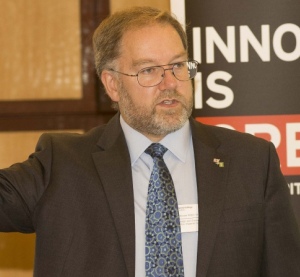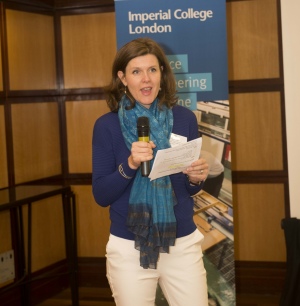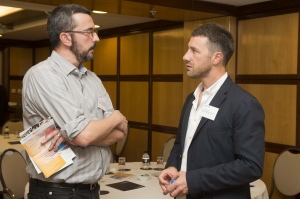Alumni and partners strengthen links with Brazil

Imperial's Professor Robin Grimes celebrated the College's longstanding relationship with Brazil at a lecture for alumni and partners.
Last Saturday 29 August in São Paulo, Brazil, around 30 guests gathered to hear Professor Robin Grimes, Chief Scientific Officer to the Foreign and Commonwealth Office, discuss how technology being developed at Imperial can meet global challenges.

Professor Robin Grimes
In a lecture to alumni, guests from partnering institutions such as Universities of São Paulo and Campinas, representatives from the Foreign and Commonwealth Office and a number of Imperial staff, Professor Grimes highlighted the importance of finding the right partners for successful research collaborations, and offered the alumni present an opportunity to catch-up on some of the recent developments at Imperial, including the development of the new White City Campus.

Joanna Crelin, Consul General in Sao Paulo, opening the event
The event was opened by Joanna Crellin, Consul General at the British Consulate-General Sao Paulo [pictured right], who spoke about the increasing investment by the UK in science and innovation partnerships where Brazil is particularly important. She said, “It’s a great indication of Imperial College London’s strength that so many of you have come together here today”.
Professor Grimes emphasised the deep and important links between Imperial and Brazil. Imperial has welcomed a large number of Brazilian students for decades, and currently has 16 Brazilian staff and has over 500 contactable alumni based in Brazil.
Alongside Professor Grimes were a number of Imperial academics, including Dr Kris Anderson (Department of Earth Science and Engineering), who highlighted the work of Imperial’s largest collaboration with Brazil, the Sustainable Gas Institute (SGI). He said, “It’s a unique academic–industry partnership, and a ground-breaking collaboration between the United Kingdom and Brazil. We aim to deliver world class research on gas innovation, and can do so thanks to funding by the BG Group.”
David Colvin (BEng Mechanical Engineering, 1963) [pictured at top] said, “The event has brought back many memories for me. One of my favourites was a maths lecturer who tried to explain how to calculate a square root with a mechanical adding machine – I think it’s something today’s students will have never heard of. I was very impressed by the mind-blowing things in Professor Grimes’ presentation. Comparing the research we were presented with today with the nuclear technology which was just starting to be developed when I studied at Imperial, it’s clear technology has progressed very far – I’m very pleased to see that Imperial is still at the forefront of these developments.”
Victor Grostein (MSc Civil and Environmental Engineering 1976) [pictured at top], explained that he was inspired to study at Imperial by the influential book “Traffic in Towns” by the Imperial academic Sir Colin Buchanan. “On a visit to London, I decided to pop into Imperial and I was attended to by the then Head of Department – an experience that only strengthened my desire to study at Imperial”, he said. “I was inspired to go into traffic management which I still work in – and it’s of fundamental importance to the city of São Paulo. My most impressive memory is the amount of books students at Imperial had access to – not only at the Imperial library but also through the University of London. I really do owe most of my career success to my studies at Imperial.”

Professor Cesar Azevedo (PhD Materials 1995) from USP with Dr Gerard Gorman (Earth Science & Engineering)
Other Imperial staff present included Dr Gerard Gorman (Department of Earth Sciences and Engineering) [pictured left], who leads on an Intel Parallel Computing Centre on seismic imaging in collaboration with the SENAI CIMATEC Supercomputing Centre for Industrial Innovation in Salvador and the BG Group, and Dr Susan Hodgson (Faculty of Medicine) whose research uses high spatial resolution laser ablation inductively coupled plasma mass spectrometry (ICP-MS) along with detailed dental histology to reconstruct the history of early childhood lead exposure which could help prevent exposure to heavy metals in Brazilian children.
The Brazil Forum has 150 members and acts as a catalyst to bring together Imperial students, academic staff and alumni who are involved or interested in Brazilian issues or currently working with Brazilian institutions. Professor Jeroen Lamb (Department of Mathematics), chair of the Brazil Forum said, “The forum is a formalised informal gathering of people, which helps to promote opportunities related to Brazil.”
Find out about Imperial’s research links with Brazil on the Brazil Forum’s guide, or discover more Imperial's global partnerships. To find out how you can get involved, please contact Prisca Merz in the International Relations Office.
Article text (excluding photos or graphics) © Imperial College London.
Photos and graphics subject to third party copyright used with permission or © Imperial College London.
Reporter
Jessica Adams
Advancement
Prisca Merz
International Relations Office